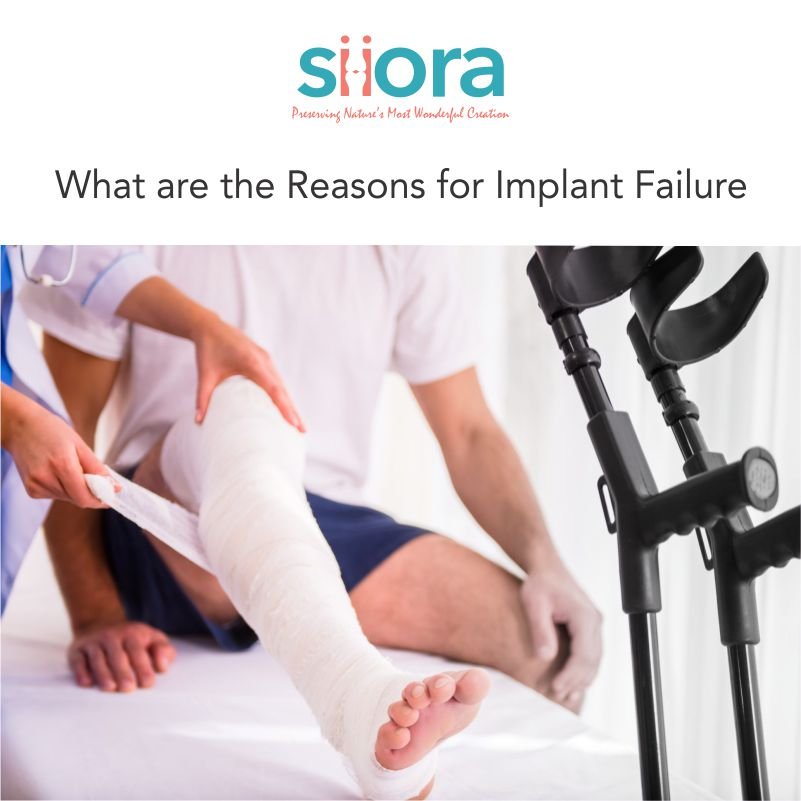Orthopedic implants have revolutionized bone repair and joint replacement, offering patients a path to restored mobility and pain relief. However, implant failure can sometimes occur, leading to frustration and the need for revision surgery. This blog post dives into the reasons why orthopedic implants might fail after surgery, exploring factors related to the implants, the surgical procedure, and the patient’s biology. Knowing these will help you know the reasons for implant failure better and you can guide if someone in your known has undergone any orthopedic surgery.
Understanding Implant Mechanics and Materials
Orthopedic implants are designed to withstand significant forces. They bear weight, stabilize fractures, and replace worn-out joints. However, these demands can lead to several potential failure mechanisms and become the reasons for implant failure:
Mechanical Wear and Tear
Over time, the constant friction between implant components can cause them to wear down. This is particularly relevant in joint replacements, where the implant surfaces rub against each other millions of times a year.
Fatigue Failure
Repeated stress, even within normal limits, can eventually lead to cracks or fractures in the implant material. This is more common with certain activities or in patients who don’t follow weight-bearing restrictions after surgery.
Corrosion
The body’s environment can sometimes cause the implant material to degrade, leading to a loss of strength and potential release of debris. Modern biocompatible implants are typically made of biocompatible materials that resist corrosion, but it’s still a factor to consider.
What is the Role of Surgical Technique in Causing Implant Failure?
The success of an implant also hinges on the surgical procedure itself. Here’s how surgical factors can influence implant longevity:
Improper implant selection
Choosing the wrong size or type of trauma implant for the specific bone or joint can lead to improper load distribution and stress concentration, ultimately increasing the risk of failure. Thus, a thorough diagnosis is necessary to select the right implant.
Incorrect placement
Precise positioning of the implant is crucial. Misalignment or inadequate fixation can cause excessive stress on the bone-implant interface, hindering bone healing and potentially loosening the implant. Thus, it is important to find an experienced orthopedic surgeon with a proven record for surgery.
Surgical Complications
Infection at the surgical site can damage surrounding bone and compromise implant stability. Other complications like bleeding or hematoma formation can also negatively impact healing. Regular appointments post-surgery may significantly minimize such complications.
What is the Role of Patient Biology and Healing?
An individual’s biology plays a significant role in how well their body interacts with the implant. Here are some patient-related factors that could be the reasons for implant failure:
Bone Quality
Osteoporosis or other bone conditions that weaken the bone can make it difficult for the implant to achieve a secure hold. This can lead to loosening and potential failure. An experienced orthopedic surgeon often performs tests to assess the bone quality of the patient before surgery.
Age and Activity Level
Younger, more active patients put greater stress on their implants. Surgeons consider age and activity level when choosing implant materials and designs. However, the fact can also be not denied that recovery is often quicker in the young than in the elderly.
Underlying Medical Conditions
Certain medical conditions, such as diabetes or rheumatoid arthritis, can impair bone healing and increase the risk of infection, both of which can contribute to implant failure.
Lifestyle Factors
Above all, the patient’s lifestyle is crucial in implant failure or successful orthopedic surgery. Smokers tend to experience delayed healing whereas, the risk of implant failure is also high. Tobacco hinders the healing process and prevents the formation of new bone. Alcohol affects the same manner. Thus, these habits should be avoided.
How to Minimize the Risk of Implant Failure?
The steps that can be taken to minimize the risk of implant failure may include:
Pre-operative Planning
Careful assessment of the patient’s bone health, activity level, and medical history is crucial for selecting the most appropriate implant and surgical approach.
Surgeon Experience
Choosing an experienced surgeon well-versed in the specific implant and surgical technique is vital. Always consider a few options before selecting one.
Patient Compliance
Following post-operative weight-bearing restrictions, rehabilitation exercises, and medication regimens is essential for optimal healing and implant stability. Besides this, do not miss doctor’s appointments, as any complications, if there, can be addressed timely by the orthopedist.
What If the Implant Fails?
If you experience persistent pain, stiffness, or instability around the implant site, consult your doctor. Imaging tests like X-rays or CT scans can help diagnose implant failure. Treatment options might involve revision surgery to replace the implant or repair any damage. In such cases, do not play the waiting game. It could lead to severe complications.
Conclusion
Orthopedic implants are a remarkable medical technology, but they are not infallible. Understanding the potential reasons for implant failure can help patients work with their doctors to optimize surgical outcomes and ensure a successful recovery. Besides this, do understand that surgical success does not only lie on the shoulders of surgeons, rather, patients also have an equal role to play. Thus, be careful with the post-surgical instructions given by the surgeons. Follow them strictly and enjoy a speedy & better recovery.
About Siora
When it comes to finding a CE-certified range of trauma implants, Siora Surgicals is the name you can trust. Covering a huge national and international orthopedic market, Siora has become a leader in the global orthopedic implant manufacturing industry. Established over 3 decades ago, the company has gradually increased its market globally by making new distributors and partnering with leading orthopedic surgeons. Siora Surgicals Pvt. Ltd. has served clients in 50+ countries and it relishes its in-house manufacturing facility based in RAI District, Sonepat, Haryana.
The company boasts technologically advanced machines to produce a precise range of orthopedic implants and instruments that meet international standards. Above all, Siora is also known for keeping its inventory updated with newer and improved implants. It is also a regular exhibitor at the premier Florida International Medical Expo (FIME). The company has also marked itself as a trustworthy player in OEM/contract manufacturing service industry.







